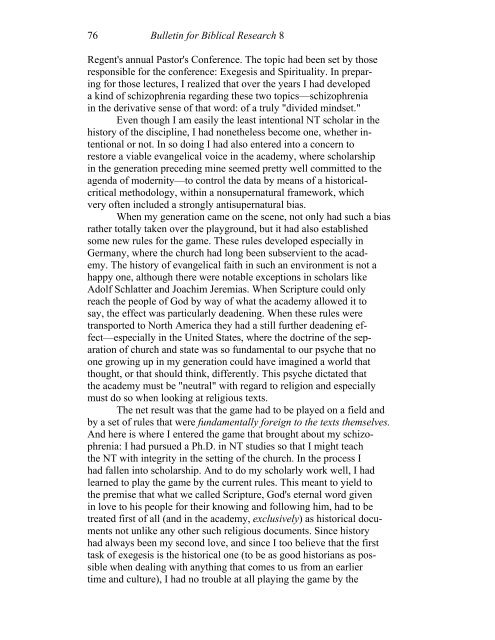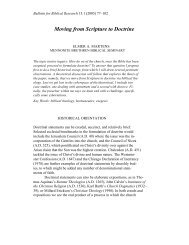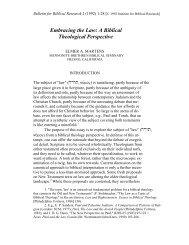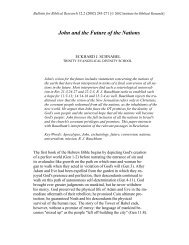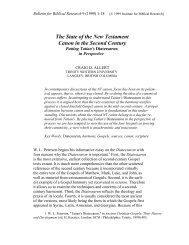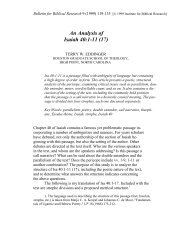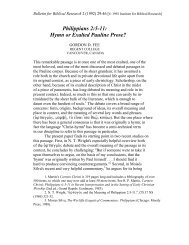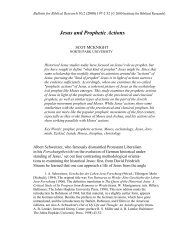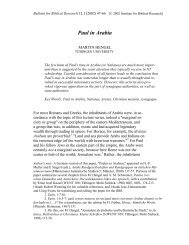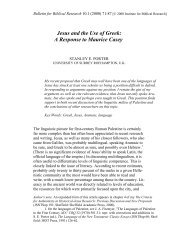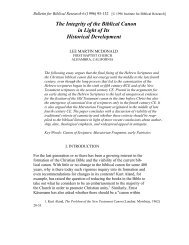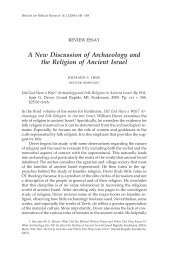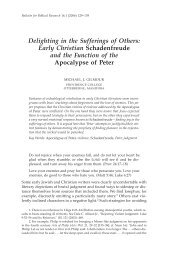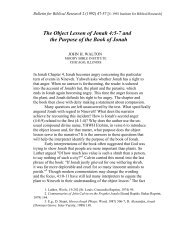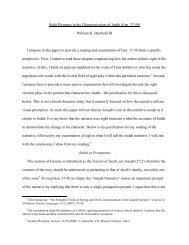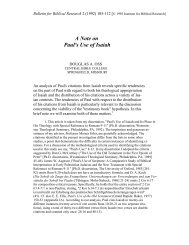Reflections on Exegesis and Spirituality in Philippians 4:10-20
Reflections on Exegesis and Spirituality in Philippians 4:10-20
Reflections on Exegesis and Spirituality in Philippians 4:10-20
Create successful ePaper yourself
Turn your PDF publications into a flip-book with our unique Google optimized e-Paper software.
76 Bullet<strong>in</strong> for Biblical Research 8<br />
Regent's annual Pastor's C<strong>on</strong>ference. The topic had been set by those<br />
resp<strong>on</strong>sible for the c<strong>on</strong>ference: <strong>Exegesis</strong> <strong>and</strong> <strong>Spirituality</strong>. In prepar<strong>in</strong>g<br />
for those lectures, I realized that over the years I had developed<br />
a k<strong>in</strong>d of schizophrenia regard<strong>in</strong>g these two topics—schizophrenia<br />
<strong>in</strong> the derivative sense of that word: of a truly "divided m<strong>in</strong>dset."<br />
Even though I am easily the least <strong>in</strong>tenti<strong>on</strong>al NT scholar <strong>in</strong> the<br />
history of the discipl<strong>in</strong>e, I had n<strong>on</strong>etheless become <strong>on</strong>e, whether <strong>in</strong>tenti<strong>on</strong>al<br />
or not. In so do<strong>in</strong>g I had also entered <strong>in</strong>to a c<strong>on</strong>cern to<br />
restore a viable evangelical voice <strong>in</strong> the academy, where scholarship<br />
<strong>in</strong> the generati<strong>on</strong> preced<strong>in</strong>g m<strong>in</strong>e seemed pretty well committed to the<br />
agenda of modernity—to c<strong>on</strong>trol the data by means of a historicalcritical<br />
methodology, with<strong>in</strong> a n<strong>on</strong>supernatural framework, which<br />
very often <strong>in</strong>cluded a str<strong>on</strong>gly antisupernatural bias.<br />
When my generati<strong>on</strong> came <strong>on</strong> the scene, not <strong>on</strong>ly had such a bias<br />
rather totally taken over the playground, but it had also established<br />
some new rules for the game. These rules developed especially <strong>in</strong><br />
Germany, where the church had l<strong>on</strong>g been subservient to the academy.<br />
The history of evangelical faith <strong>in</strong> such an envir<strong>on</strong>ment is not a<br />
happy <strong>on</strong>e, although there were notable excepti<strong>on</strong>s <strong>in</strong> scholars like<br />
Adolf Schlatter <strong>and</strong> Joachim Jeremias. When Scripture could <strong>on</strong>ly<br />
reach the people of God by way of what the academy allowed it to<br />
say, the effect was particularly deaden<strong>in</strong>g. When these rules were<br />
transported to North America they had a still further deaden<strong>in</strong>g effect—especially<br />
<strong>in</strong> the United States, where the doctr<strong>in</strong>e of the separati<strong>on</strong><br />
of church <strong>and</strong> state was so fundamental to our psyche that no<br />
<strong>on</strong>e grow<strong>in</strong>g up <strong>in</strong> my generati<strong>on</strong> could have imag<strong>in</strong>ed a world that<br />
thought, or that should th<strong>in</strong>k, differently. This psyche dictated that<br />
the academy must be "neutral" with regard to religi<strong>on</strong> <strong>and</strong> especially<br />
must do so when look<strong>in</strong>g at religious texts.<br />
The net result was that the game had to be played <strong>on</strong> a field <strong>and</strong><br />
by a set of rules that were fundamentally foreign to the texts themselves.<br />
And here is where I entered the game that brought about my schizophrenia:<br />
I had pursued a Ph.D. <strong>in</strong> NT studies so that I might teach<br />
the NT with <strong>in</strong>tegrity <strong>in</strong> the sett<strong>in</strong>g of the church. In the process I<br />
had fallen <strong>in</strong>to scholarship. And to do my scholarly work well, I had<br />
learned to play the game by the current rules. This meant to yield to<br />
the premise that what we called Scripture, God's eternal word given<br />
<strong>in</strong> love to his people for their know<strong>in</strong>g <strong>and</strong> follow<strong>in</strong>g him, had to be<br />
treated first of all (<strong>and</strong> <strong>in</strong> the academy, exclusively) as historical documents<br />
not unlike any other such religious documents. S<strong>in</strong>ce history<br />
had always been my sec<strong>on</strong>d love, <strong>and</strong> s<strong>in</strong>ce I too believe that the first<br />
task of exegesis is the historical <strong>on</strong>e (to be as good historians as possible<br />
when deal<strong>in</strong>g with anyth<strong>in</strong>g that comes to us from an earlier<br />
time <strong>and</strong> culture), I had no trouble at all play<strong>in</strong>g the game by the


